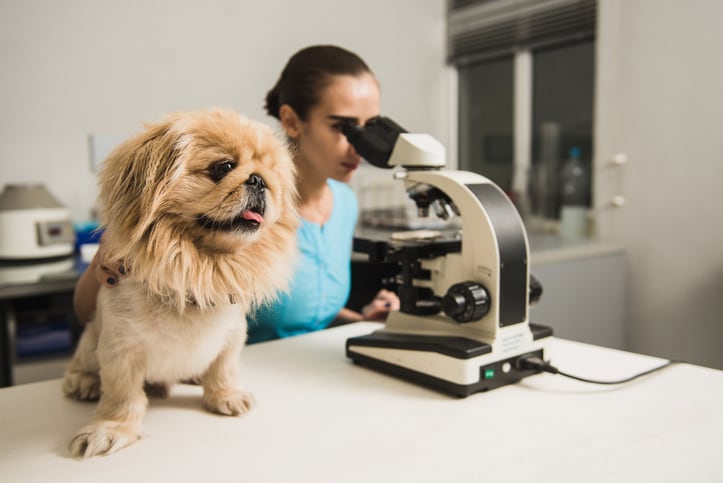“It's [personalization] definitely something that's growing in the marketplace. And I think that we noticed that in the human trends and so to be able to deliver that to the pet, especially on the dog side. It was something that we saw that seemed to be important,” explained Sara McCullough, pet nutritionist at Just Right, a personalized pet food subscription service based in St. Louis, MO.
Omega 3 and omega 6 are popular ingredients for skin and coat health, and the market is also seeing an uptick in prebiotics for digestion. Just like the human dietary supplement category, sales of pet supplements also jumped in 2020. Packaged Facts reported that growth rates for pet supplements quadrupled from 2019 to 2020.
Using Just Right's online blend creation quiz, dog owners are asked questions that range from protein and inclusion preferences to activity and stool consistency. The inputs are used to formulate a tailored blend to support each individual dog.

“Dogs are their own people as well. So every dog is different, every dog has a different metabolism. They have different activity levels. They have different needs, some dogs might have some sensitivities to some ingredients and a bag of dog food from PetSmart and Petco may not be able to to address that for them. Sometimes dogs may need prescription diets, and we don't have those, but we do offer some blends that have some things like ingredient sensitivities and then some issues like skin and coat and brain health we developed for the aging dog as well and the perfect puppy nutrition,” said McCullough. “So those there's all sorts of little life stages.”
Humans go through stages and phases too. And while fad diets like keto and plant-based may be okay for humans, the health benefits don’t always translate the same way among dogs. Case in point: grain-free.
The grain-free category
“These diets became extremely popular in recent years in parallel with the clean-eating, gluten-free food trend in humans, and a desire to have our pets eat essentially what we eat,” Rebecca Greenstein, DVM, veterinary medical advisor for Rover. “The problem is, dogs are not small humans and celiac disease is quite rare in their species, so tinkering with their nutrition for somewhat arbitrary reasons is now proving to be not only ill-advised, but potentially fatal.”
While Just Right does offer grain-free as well as plant based options, MCCullough said pet owners should ask their vet before committing to such diets.
“Grains are a very rich source of carbohydrates to supply the pets body with energy and they're useful in not using the protein as an energy source so that they can be used to meet important functions like protein synthesis. Grains can also provide many additions to the diet like antioxidants to help support the immune system. They’re also a huge contributor to essential fatty acids that help support healthy skin and coat,” McCullough said.
According to Greenstein, the absence of grain in dogs’ diets seems to affect the bioavailability of certain essential nutrients like taurine, which in turn can cause disease of the heart muscle.
In fact, in 2018, the Food and Drug Administration announced that it is investigating a link between grain-free diets and this type of heart disease.
“We are concerned about reports of canine heart disease, known as dilated cardiomyopathy (DCM), in dogs that ate certain pet foods containing peas, lentils, other legumes or potatoes as their main ingredients. These reports are highly unusual as they are occurring in breeds not typically genetically prone to the disease,” stated Martine Hartogensis, DVM, deputy director of the FDA’s Center for Veterinary Medicine’s Office of Surveillance and Compliance. “The FDA is investigating the potential link between DCM and these foods. We encourage pet owners and veterinarians to report DCM cases in dogs who are not predisposed to the disease.”
The report pointed to a diet heavy in peas, lentils, chickpeas and potatoes, all carbohydrates that typically replace grains.
Unfortunately, McCullough said consumers see grains as ‘villians of the pet food industry.’
Fact or filler
One of the most common misperceptions is that whole grains may be fillers in pet foods. However, filler implies the ingredient has little or no nutritional value, but whole grains do contribute vital nutrients such as vitamins, minerals, and essential fatty acids to pet foods. Various grain products also provide protein, which may be easier for the pet to digest than some proteins from meat, according to Tufts University.
Grain-free canine diets picked up in 2007, the year contaminated kibble was recalled from a supplier in China. Fast forward 14 years and grain-free pet food is now an estimated $3 billion dollar industry.
As the Grain-Free Pet Foods: Fact vs Fiction report put it, “The growing grain-free category of the expanding pet food market is perpetuating the misperception that grain is bad for pets.”
Greenstein said one thing that can and should always be shared among humans and their pets is science.
“The potential negative impact of grain-free diets highlights the importance of choosing diets based on science rather than fad,” said Greenstein.




